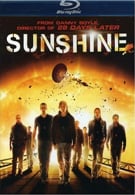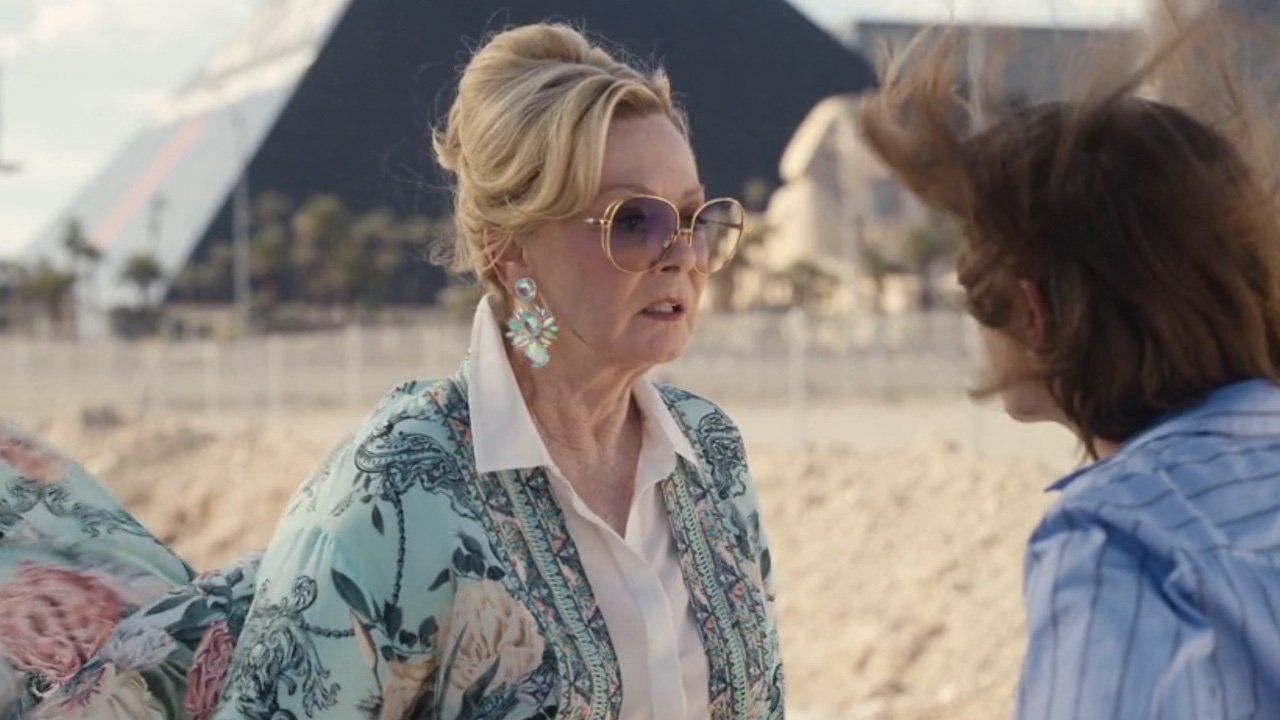If there’s one thing about Danny Boyle, the director of Trainspotting and Millions, it’s that he’s got a strong flair for originality as well as a willingness to explore and experiment with different genres. Okay that’s two things, but whether he’s tweaking the zombie-slasher genre into the extremely successful horror/social commentary that is 28 Days Later or creating his own semi-plausible, mind-bending sci-fi film, it’s easy to spot Boyle’s uncanny ability to build refreshingly new experiences into his movies. In his latest film, Sunshine, Boyle channels the energy and wonder of classics like Alien and 2001: A Space Odyssey -- all the while keeping his feet firmly planted in his own highly original science fiction creation. It’s a true testament to Boyle as a filmmaker that he’s able to capture the same sheer vastness of space and time as Kubrick and Scott without ripping them off, but he accomplishes it flawlessly, and in so doing launches Sunshine into the elitist of sci-fi company. Sunshine is set fifty years into the future and follows a crew of eight astronauts and scientists who, aboard the Icarus II, are on a mission to re-ignite our dying Sun which has earth frozen in a perma-winter. Equipped with a Manhattan sized stellar bomb and ominously named after the Icarus I, a ship that failed while on the very same quest, the Icarus II and its crew are clearly destined for trouble.
The success of Sunshine hinges largely on Boyle’s ability to keep us guessing. Will it be the massive metaphysical implications of such a grave responsibility that perturb the psyches of the crew members or will these eight humans living in extremely claustrophobic quarters while flying straight into the largest star in our solar system simply drive each other crazy? Or perhaps, while we’re all on the lookout for such distresses, something totally unexpected will take us by surprise. Boyle touches on many of these aspects briefly, which allow him to both avoid the trap of clichés and also to successfully dangle the biggest question of the film right in front of us without tipping the scales in either direction: will the crew ultimately succeed or fail?
If you’re noticing a trend here then I’ve got you right where I want you. Sunshineis a film that has me asking a lot of questions and wondering endlessly about what it’d really be like to travel through the vacuum of space. Chief among the aspects probing my mind are the absolutely breathtaking visuals, ranging from shots of deep space to various images of the Sun and even a gorgeous scene involving Mercury. Needless to say, I’ve got more than a few images permanently burned into my head that’ll come to mind when I glance at the Sun. Another angle of the film that really intrigues me is its grounding in reality. Sure, it’s a science fiction movie that takes some scientific liberties, but our Sun will eventually die and it’s not beyond the realm of possibility that when it starts to happen we’ll try and remedy it.
The sci-fi features aside, Sunshine is still a film about both human interaction and human nature, and it couldn’t succeed without an exceptionally strong cast. Leading the way is Cillian Murphy as the crew’s physicist Robert Capa. Murphy’s familiarity with Boyle (they worked together on 28 Days Later) is quite evident as he gives a grippingly realistic performance that carries the film. Murphy plays Capa with a marvelous mixture of humanity and emotion that’s somehow fused with the weight of carrying the fate of the world in his hands. He wears his responsibility on his sleeve and as the crew member who has the most intimate relationship with the payload, it’s a great choice to have him guide the story. Surprisingly, not far behind Murphy is Chris Evans (of Fantastic Four infamy) in an excellent performance as the temperamental Mace, who’s in charge of Icarus’s computer systems. The rest of the cast, which includes Cliff Curtis, Michelle Yeoh, Benedict Wong, Rose Byrne, Troy Garity and Hiroyuki Sanada, is similarly solid and as a whole Sunshine’s actors really do form the perfect ensemble.
I’ve heard a few gripes about Sunshine, mostly concerned with the final third of the film, but I have to say that I didn’t have any problems with it at all and if anything, it gets stronger as it goes along. I don’t want to spoil it, but I absolutely love the “turning point” of the movie that’s supposedly its downfall and I believe there are many more interpretations to it than most give credit for. Either way, Boyle’s vision has something for everybody, regardless of what kind of movies you love: an intense pace, unbearable suspense, philosophical questions regarding God and existence, great acting, risqué directing and even one of the year’s best musical scores. Do yourself a favor and forget everything you’ve heard about Sunshine (except for this rave) and watch it with, at the very least, an open mind and readiness to embrace the bewilderment and fascination of space, the Sun, and the awesomeness of the unknown. I’d like to preface this section of the review by saying that I’m not, and nor do I pretend to be, a technical expert. Now that’s not to say I don’t know my way around my entertainment system, which consists of a 42 inch Panasonic Plasma HDTV and a properly installed standard surround sound set-up, but it does mean that beyond that basic knowledge, I’m probably like a lot of readers out there who are wondering: what the heck is Blu-ray and is it really worth it? Well as of three weeks ago, I’m Blu-ray equipped and already have a collection of eight titles – one of which is Sunshine.
With that said, let’s delve into the special features of Sunshine, which are vast, informative, and endlessly interesting. First up are the commentaries: one by director Danny Boyle and the other by the film’s scientific advisor, Dr. Brian Cox. Boyle’s commentary is equal parts technical analysis of his filmmaking and dissection of the plot and themes. As far as I can tell, he’s quite happy with how the film turned out and genuinely enjoys talking about it, which certainly makes for an intriguing discussion. Cox’s commentary is a little surprising in that he’s actually very engaging and easy to listen too, despite the heavily scientific stuff he’s talking about. As somebody who’s always been into astronomy and space, I loved every minute of Cox’s dialogue and I highly recommend it.
The next feature is Web Production Diaries. Nearly forty minutes in length, the web-released content offers a decent look at how Sunshine was put together with various segments that range from the actors to the directors and all the way to the producers, stunt co-coordinators and production designers. What it essentially comes down to with these “making-of” specials is whether or not you enjoyed the film in question and since I did enjoy this particular film, it was nice to meet some of the people that made it possible.
Before I get to some of the HD-only content that’s specific to the Blu-ray release, I’d like to mention the inclusion of Sunshine’s HD trailer as a special feature. Normally, I just skip over the trailer because chances are I’ve already seen it too many times on TV or prior to other movie screenings. But Sunshine’s trailer is something special and I’m even going to go as far as saying it’s the best film trailer I’ve ever seen. Previously, I’d only viewed the trailer online, so I jumped at the chance to watch it again, this time on a big screen with full surround sound, and it absolutely blew me away. If you ever want to briefly show off your new home entertainment system, this is the perfect clip to use.
The final feature I’m going to mention is the HD-exclusive Enhanced Viewing Mode: “A Brilliant Vision”, which offers picture-in-picture pop ups (while watching the film) of cast and crew interviews and behind the scenes footage. These PIPs offer about twenty minutes of extra content and they really don’t intrude very much on a normal viewing of the film, so they’re definitely worth a look, even if you’re just running through the movie a second time. There’s also a feature called Journey into Sound: Surround Sound Enhancement which allows you to fiddle around with your speakers and interchange the dialogue and music of certain scenes. It’s certainly a fun little gimmick but the novelty wears off pretty quickly and it’s not something I’ll likely revisit.
Overall, I’m more than ecstatic with my purchase of Sunshine and if you’re looking to test the Blu-ray waters, this is a great place to start.
Hacks Went Back To Vegas, And It Made Me Miss The Old Seasons For One Big Reason
Tom Cruise's Running Style In The Mission: Impossible Films Is Iconic, And Apparently, It's Connected To One Of His Outsiders Co-Stars
Somebody Actually Used It’s Always Sunny In Philadelphia’s Musical To Propose, And It’s Weirdly Sweet











